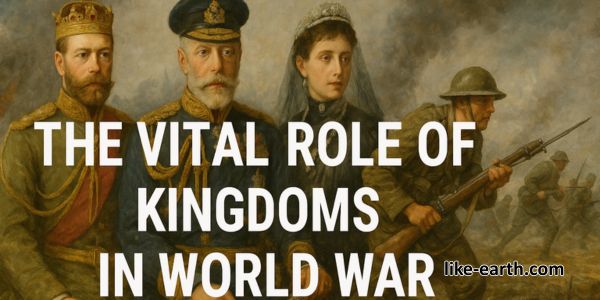The Vital Role of Kingdoms in World War

While republics and emerging democracies have taken the spotlight in modern narratives, the impact of monarchies cannot be underestimated. Their involvement in diplomacy, wartime morale, and even active combat support reveals a layer of complexity often overlooked in war analyses.
Historical Context of Royal Involvement
Before the 20th century, Europe was largely ruled by monarchies. When World War I erupted in 1914, royal families still held significant power. The conflict saw cousins—King George V of the United Kingdom, Kaiser Wilhelm II of Germany, and Tsar Nicholas II of Russia—on opposite sides of the battlefield.
These familial ties, ironically, did not prevent war. Instead, national interests and political pressure overrode bloodlines. This scenario exemplifies how monarchies, even when related, were bound more by duty to their nations than by personal connections.
Monarchies as Symbols of Unity
During the war, monarchs played critical roles in maintaining national unity. In the United Kingdom, King George V’s presence was more than ceremonial. He visited troops, boosted public morale, and embodied continuity during a time of crisis. The royal family’s resilience inspired a war-weary population. The Vital Role of Kingdoms
In Japan, Emperor Hirohito was portrayed as a divine figure. His support for the war effort became a rallying cry for both military and civilian sectors. While his direct involvement is still debated, the power of monarchy as a unifying symbol was undeniable.
Military Contributions by Kingdoms
Several kingdoms provided military resources during the wars. British colonies and protectorates under monarchical rule supplied soldiers, resources, and logistics. India, for example, contributed over a million troops during World War I under the British crown.
Similarly, Belgium’s King Albert I was lauded for leading his troops in person. His leadership not only inspired Belgian resistance but also earned global admiration. Such instances highlight that monarchs were not passive observers but active participants in warfare.
Alliances and Diplomatic Maneuvers
Royal diplomacy was instrumental in shaping wartime alliances. Monarchs often used their personal relationships to foster or challenge alliances. This royal network added layers of informal yet powerful negotiation channels, especially during the initial phases of the wars.
For example, the downfall of the Russian monarchy significantly altered the power dynamics on the Eastern Front. Without Tsar Nicholas II, the political vacuum destabilized the Russian war effort and contributed to the Bolshevik revolution, thereby influencing the war’s trajectory.
The Decline of Monarchies Post-War
Both world wars signaled a shift away from monarchic governance. The abdication of many monarchs after the wars marked the rise of republics. Nonetheless, surviving monarchies like the British royal family adapted, transforming into more symbolic institutions with limited political power but enduring public influence.
Despite the decline, the legacy of royal contributions continues to be studied and respected. Monarchies evolved, but their role during the war remains an integral part of their national identities.
Case Study: The British Monarchy’s War-Time Leadership
The British royal family stands as a model of monarchical involvement in global conflict. During World War II, King George VI’s refusal to leave London during bombings signified solidarity. Queen Elizabeth (the Queen Mother) visited bomb sites and supported wounded soldiers, gaining the respect and affection of the public.
Princess Elizabeth, now Queen Elizabeth II, joined the Auxiliary Territorial Service and served as a mechanic. This direct involvement symbolized a monarchy that shared in the nation’s trials. The British crown’s wartime actions reinforced its place in the hearts of the people.
Legacy and Modern Relevance
Today, the role of kingdoms in world war is a subject of historical reverence and academic inquiry. Understanding this role offers insights into how leadership, symbolism, and diplomacy affect global conflict. Modern monarchies, while politically limited, continue to serve as cultural and unifying icons, especially during times of national crises.
Exploring royal influence in wartime also reminds us that leadership takes many forms. Whether through battlefront leadership, diplomacy, or moral support, monarchies shaped the world in ways still felt today.
For more global historical insights and environmental education, visit our main page. The Vital Role of Kingdoms
Also, check out the discussions on modern monarchy and history through our partner channel on WhatsApp.



